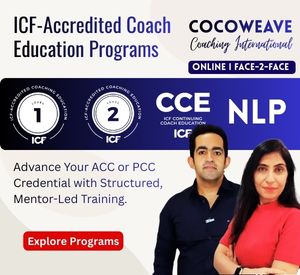Digital coaching platforms have come a long way from just being an online tool for coaches to manage their businesses. They have evolved into powerful tools to enhance coaching practices.
In the realm of digital coaching, the future looks promising. Joel DiGirolamo, vice president of research and data science at ICF, says that generative large language models and deep learning AI systems such as ChatGPT and GPT-4 will transform AI coaching.
“When you tune those algorithms to coaching,” he says, “they can be powerful systems with a high impact.”
Here is a look at three impactful ways digital coaching platforms are reshaping the coaching profession.
1) Unleashing Human Potential and Enabling Growth
Because the coaching process is human-centric, it can be difficult to imagine how technology could support both coach and client development. However, tools exist that are helping coaches improve their practice and more effectively partner with clients toward meaningful growth. These coaching platforms can continually refine their suggestions, tailoring them based on an individual’s progress and feedback. This ensures that the coaching process remains relevant and effective.
BetterUp uses research-backed approaches with input from human coaches to develop its technology. BetterUp also analyzes anonymized insights from coaching engagements to better understand coaching processes, competencies, and long-term impact. These insights are helping not only to transform the understanding of digital coaching but also of human development and workplace well-being.
To better support client growth, the AI-empowered platform Ovida assists coaches in developing their practice and deepening their skills. Utilizing AI technology for both verbal and nonverbal analysis, Ovida extends these capabilities to access coaching competencies like active listening, effective questioning, trust building, and sustaining a strong coaching presence. This data and feedback serve as a means for self-reflection, extending the benefits of coaching, supervision, and mentoring.
EZRA adopts a holistic approach to professional growth, merging coaching with learning and development strategies through technology. This tool complements virtual coaching with accessible resources for on-demand learning and reflection.
2) Expanding Coaching Services and Accessibility
Historically, coaching has been expensive, limiting access to some individuals and organizations. For example, senior-level employees are approximately two-and-a-half times more likely to receive coaching than their entry-level counterparts, according to Defining Coaching Cultures, the latest research from ICF and the Human Capital Institute (HCI). In the same study, organizations reported that they are using emerging solutions like digital coaching platforms and AI as cost-effective strategies to extend coaching access to all employees. So, what exactly can these tools do?
With a hybrid AI-powered chatbot and coaching programs platform, evoach helps coaches customize coaching services to expand their reach across an organization or among a broader range of individual clients. Coaches select modules for clients to complete, and then clients can navigate these modules independently between sessions. This coaching model builds off other self-paced learning opportunities for professionals with busy schedules or organizations looking to create a learning and development library.
Coach Vici introduces an organizational coaching chatbot to broaden access to coaching, extending its reach beyond the C-suite. Their chatbot is available 24/7 and complements human-to-human coaching sessions with goal-setting check-ins. The coaching bot can serve a dual purpose: to aid individual development and align employees’ personal objectives with overall organizational strategy.
AceUp employs a systemic perspective, considering individuals, teams, community partners, and the organization as integral parts of a dynamic system rather than separate entities. AI-powered tools are integrated throughout AceUp’s coaching interactions, enabling coaches to effectively address individual and system-wide requirements. In response to the growing prevalence of hybrid and remote work arrangements, AceUp leverages technology to bridge gaps between isolated teams and unite individuals in pursuit of a common organizational mission.
AI and digital tools are also having an impact in nontraditional settings. EPOG Academy blends technology and one-on-one coaching to empower underserved high school students to discover their potential. Based on a student’s strengths, aspirations, and interests, its AI Career Pathfinder tool uses the same technology as ChatGPT to report five potential career paths within reach that the student might not have previously considered. Subsequently, a human coach collaborates with the student to delve deeper into the results and create an actionable plan.
3) Measuring Growth
A common challenge for coaches has been the ability to effectively measure their impact on an individual or within an organization. The ICF and HCI research cites that 60% of respondents do not have the tools to evaluate the effectiveness of their coaching. In thinking about the next two- to three-year period, however, the majority of respondents (66%) view measurement tools as the top tech-driven benefit that influence coaching spaces.
CoachHub partners coaches with human resources (HR) leaders and managers in designing company-wide initiatives. It separates organizational and coachee goals, providing organizations with anonymous and aggregated data that visualizes the company’s progress while maintaining confidentiality. Ultimately, this data helps HR leaders understand coaching’s return on investment (ROI) and justify investing in coaching as a strategic initiative.
Loupe is a science-backed self-awareness tool that turns feedback from colleagues and the community into actionable data and insights. Developed by coaches for coaches, their “Action Framework” offers three types of feedback depths — big picture, domain-specific, and day-to-day — to meet the needs of any type of coaching engagement. Collectively, the Action Framework assists clients in harmonizing immediate and long-term growth objectives, all while acknowledging the importance of continuous improvement.
Summary
The accessibility, flexibility, and personalization that the advent of digital coaching offers has made it possible for anyone to engage in personal and professional development. And there are bound to be more dramatic shifts in the coaching profession in the future.
Seeing these shifts as a powerful force for good, my colleague Joel proposes the following: “Ask yourself, what can you do individually today as a coach to be a part of that progress, to keep the profession moving forward, and to spread the use of coaching skills for enhanced dialogue in all our cultures?”
If you’re interested in staying up to date with the latest articles about how the future of coaching can continue to foster well-being worldwide, sign up for the ICF Thought Leadership Institute’s newsletter.
Disclaimer
The views and opinions expressed in guest posts featured on this blog are those of the author and do not necessarily reflect the opinions and views of the International Coach Federation (ICF). The publication of a guest post on the ICF Blog does not equate to an ICF endorsement or guarantee of the products or services provided by the author.
Additionally, for the purpose of full disclosure and as a disclaimer of liability, this content was possibly generated using the assistance of an AI program. Its contents, either in whole or in part, have been reviewed and revised by a human. Nevertheless, the reader/user is responsible for verifying the information presented and should not rely upon this article or post as providing any specific professional advice or counsel. Its contents are provided “as is,” and ICF makes no representations or warranties as to its accuracy or completeness and to the fullest extent permitted by applicable law specifically disclaims any and all liability for any damages or injuries resulting from use of or reliance thereupon.
Authors
Post Type
Blog
Audience Type
Coach Educators, Experienced Coaches, External Coaches, HR & Organizational Leaders, ICF Assessors, ICF Chapter Leaders, Individuals Interested in Experiencing Coaching, Internal Coaches, Managers/Leaders Using Coaching Skills, Mentor Coaches, New Coaches, Professional Coaches, Team and Group Coaches
Topic
Future of Coaching
Related Posts
How to Master AI and Authenticity in Coaching
How do you stay relevant when AI can now draft client assessments…
Personal Branding for Coaching — Amplified by AI
How can you stand out as a coach in a crowded market…
Coaching as a Strategic Advantage: What the 2025 Global Coaching Study Reveals
The 2025 ICF Global Coaching Study highlights continued global growth in professional coaching alongside…







